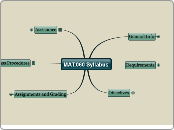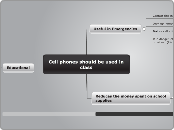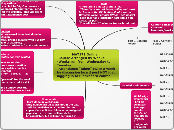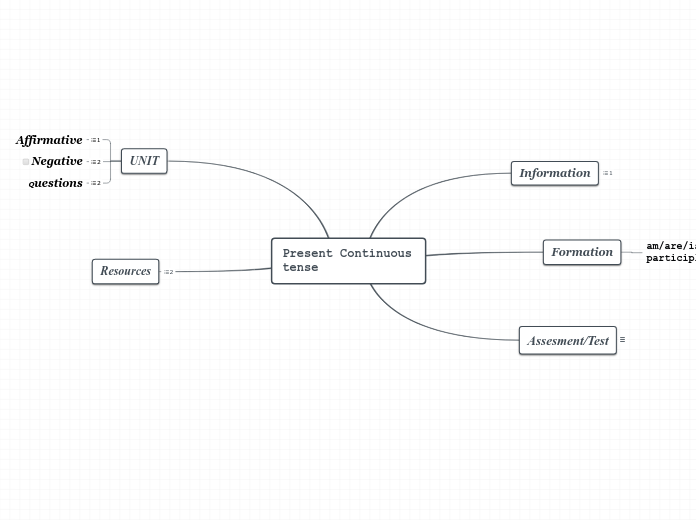MAT.060 Syllabus
Assignments and Grading
Group Project
There will be one group project in the second half of the semester. Groups will typically consist of about 3 people. Each group will work with one of the five study skill areas discussed through the semester and try to add something new for the class to see. Groups will be given some class time in a computer lab to work on their presentations but will also be expected to spend some time outside of class working as well.
In Class Activities & Assignments
Occassionally there will be activities for you to work on in class. It is important that you bring your materials from your other MAT class as they will often be the subject of these activities.
Discussions
It is expected that you will take part in in-class discussions, which will start by week 3.
Journal & Log Entries
You will typically turn in a journal / log form each week.
The journal half of the form will be a way for you to track you progress choosing and applying new study skills throughout the semester.
The log will require you to record the work you do outside of your other MAT course. You'll track how often you work, what you do, and for how long.
Essays
You will write two essays. Each will be a minimum of one page, double spaced. Handwritten or word-processed is fine. Style issues will largely be left up to you -- the content will be the important thing.
The first essay will discuss your past with math, why you're taking MAT 060, and what you hope to gain.
The second essay will reflect on skills you've gained since the first essay. It will also talk about your plans to continue to improve your study skills in the future.
Overview of Assignments
This is a credit/no credit course, so you will not earn a letter grade. You can earn points from the following assignments. You need to earn at least 75% of the points (at least 375 points) to earn credit in the course. Assignments will include the following:
Two essays (100 points each) 200 points
Eleven Journal / Log entries (~9 points each) 100 points
Group project 100 points
Attendance (~7 points per day) 100 points
500 points
Late Policy
While you do not specifically receive grades, it is expected that you will turn materials in when requested and be in class to take part in discussions and activities. Failure to turn in materials on time, attend, or participate can be cause for receiving no credit in the course.
Academic Dishonesty
Instructor Policy
Instructor Policy on Academic Dishonesty and Plagiarism
In this course, academic dishonesty will not be tolerated.
On the first offense the assignment will not be accepted.On the second offense you will receive ‘No Credit’ for the course.Offenses include, but are not limited to:
Presenting the work of others as your own. This includes copying from another student.MMCC Policy
MMCC Policy on Academic Dishonesty and Plagiarism
Academic Dishonesty: No student shall:
Share or obtain exam questions or material not authorized by the instructor.
Complete exams or performance elements of a course for another student or have someone else complete it for them.
Plagiarism: Plagiarism is using another’s ideas as one’s own. Plagiarism has two forms, unintentional and intentional. Unintentional plagiarism is usually the result of students being unfamiliar with the academic conventions of citation and documentation. Intentional plagiarism is the result of students knowingly submitting the work of others as their own. This includes, but is not limited to:
Copying someone else’s work.
Using exact quotations without proper citation.
Buying papers (e.g. on the internet).
Including paraphrased material without acknowledging its source.
All acts of plagiarism and academic dishonesty will first be dealt with by the instructor. Penalties may range from revision to failing the assignment or the course. Instructors must report all acts of intentional dishonesty or plagiarism, or any penalty resulting in failure of the course, to the Vice President of Academic Services and the Dean of Student Services. Repeated violations may result in further discipline, up to and including dismissal. Students may appeal any grade affected by a charge of academic dishonesty or plagiarism through the Grade Grievance Procedure.
Class Procedures
Please bring any concerns about the classroom environment to your instructor before, after, or outside of class.
Between Classes
In between class meetings plan on spending 1-2 hours:
Reading required material.Working on assignments.Practicing your new skills.Phones
Turn off all mobile phones (and other non-calculator devices) – this does not mean put them on quiet mode, it means turn them off.
Ask Questions!
Ask questions! (before, during, or after class).
In Class
Be ready to learn while in class – come with a good attitude, the course packet, note paper, pencils, and an eraser.
Pay attention, take notes, and participate.
Be respectful of your classmates.
Do not work on homework for this or other classes.
Turn off all mobile phones (and other non-calculator devices) – this does not mean put them on quiet mode, it means turn them off.
Please do not bring food to class. Beverages are acceptable if they are in re-sealable containers.
Attending (and not)
Make your best effort to attend every class. Attendance is part of your grade and is be reported to MMCC as required for determining financial aid eligibility.
If you are late to class, please come in and quietly take a seat.
If you need to leave during class, do so quietly.
Meet some of your fellow students. You may be able to study with them or just copy their notes if you miss class.If you miss class, get the notes from a neighbor and check out the supplemental materials available on Moodle.
Check Moodle for course announcements, especially in the event of any class cancellations.
Assistance
Please contact me with any questions you may have about the course and its content. I am available during office hours (and at other times by appointment), via email, as well as through the Moodle course shell.
I also encourage you to make use of the Math Lab, available in the ASC (and directly outside my office). Their hours of operation are posted in the ASC. You can also find out more about the Math Lab by following the Academic Support Center link on the left-hand side of the course under MMCC Resources in Moodle, as well as by reading the Math Lab section near the end of this syllabus.
Tips for Success
There are many, many tips for how to do well in a math course. Here are a few.
If you are interested in more, look in your textbook, look on Moodle communicate with your instructor, search on the Internet, etc.
Set aside plenty of time each week for your math course
Don't fall behind
Read the textbook, even if you don't understand everything, so you've seen the material once before the video lecture
Write down questions you have while working alone and make sure you get them answered
Take good notes, then reread and rewrite your notes later
Build a toolbox of terms, principles, concepts, and theories
Work example problems on your own, paying close attention to what happens at each step
Do the suggested homework problems (and more if needed)
Ask questions
Practice, practice, practice!
Reading / Writing Center
The Writing & Reading Center at MMCC exists to help students become better writers and readers. The WRC is a comfortable environment where students receive individualized consultation to reach the ultimate goal of developing intellectual autonomy and constructive writing and reading habits. To this end, the WRC is not merely a proofreading service; consultants are available to assist students with their writing needs in any course, and at any stage of the writing process, including planning, focusing, developing, organizing, critical thinking, engaging sources in multiple ways, and editing. In addition, because of the symbiotic nature of reading and writing, WRC consultants can also assist students with their college-level reading needs for any course. ENG 098, a one credit reading course, is offered through the WRC. This student-centered, student-directed reading course gives students a chance to learn about and develop the strategies, skills, and attitudes important for reading college-level texts. The WRC is located in the Academic Support Center in Room 136 on the Mt. Pleasant Campus and in Room 219 on the Harrison Campus. In addition, students may opt to use the WRC Moodle or e-mail writing questions with or without writing drafts to a Consultant at write@midmich.edu.
Accommodations
Any student who feels they may need an accommodation based on the impact of a disability should contact the instructor as soon as possible to discuss your individual needs. Before any accommodation is granted, you must register with Carol Santini, Director of Disability Services for MMCC. She can be reached at 989.386.6636 or at csantini@midmich.edu. More information is available via Disability Services.
Math Lab
The Math Lab provides drop-in assistance with math problems from any course, not just math courses. You will find the Math Lab in the Academic Support Center in room 219 on the Harrison campus and room 135 on the Pickard campus. Please call ahead to check hours of operation.
We ask that you do the following before coming to the Math Lab for assistance:
attend class,read the textbook,review your notes,attempt the homework problems yourself,write down your questions before coming to the Math Lab, andbring a copy of your assignment and your textbook when you come to the Math Lab.Math Lab tutors will:
help you as soon as they can for as long as they are able,answer your questions or direct you to where you can obtain answers,assist you in clarifying information,show you problem-solving methods, andwork through example problems with you.Math Lab tutors will not:
substitute as a lecturer for classes you missed,always have the answer to every question, ordo your work for you.Instructor
Room 215, Harrison Campus
Office Hours: MW 11:30am to 12:30pm or by appt.
Objectives
Be a better test taker, using before, during, and after test strategies, as well as dealing with test anxiety issues.
Study effectively, using your time wisely and paying attention to memory issues.
Make more efficient use of your homework time.
Be a better note taker, using active listening strategies and listening for important instructor cues.
Be a more effective math textbook reader, using before, during, and after reading strategies.
Requirements
Other MAT Class
It is strongly recommended that you are taking another MAT course and you should bring your materials from that course to MAT 060 each week.
Supplies
Folder or binder
Notepaper
Pencils
Eraser
Textbook
Math Study Skills Course Packet
1st edition
David & Ann Kedrowski
General Info
Some Important Dates
Friday, January 14 -- Last day to drop with a 100% refund
Saturday, March 5 to Friday, March 11 -- Spring Break
Wednesday, March 23 -- No Classes, In-Service Day
Friday, April 22 -- No Classes, Good Friday
Friday, April 29 -- Last day to drop classes
Friday, May 6 -- Last day of fall semester
Drops
If you stop participating in this class without dropping, you will receive ‘No Credit’.
Course Purpose
In many ways, learning math requires different approaches than learning in other disciplines. The textbooks are frequently difficult to read, the material is often abstract, and the topic requires lots of practice to become proficient. To make matters worse, our culture erects numerous mental roadblocks for students beginning in elementary school. MAT 060 Math Study Skills was created to help students be successful in their math courses by learning how to learn math and overcome some of the mental roadblocks that many/most students have acquired by the time they reach college.
MMCC Common Goals
The faculty at MMCC has identified three broad academic goals for all students:
We expect students to be able to THINK critically about subject matter.
We expect students to be able to DO various tasks as a result of their studies.
We expect students to be able to SHARE their thoughts and work appropriately with others.
This course meets the above stated goals as follows:
Students will THINK about their approaches to learning math, determine if any of those approaches are not successful, choose new approaches to learning math to replace the unsuccessful approaches, and then repeat this process whenever they are not as successful in their math courses as they would like to be.
Students will DO math using appropriate study skills and they must apply new study skills where old ones have been deemed unsuccessful.
Students will SHARE their thought processes in written form with their instructor via essays and journal entries. They will also share their thought processes with the instructor and the class verbally.
Catalog Description
This course will emphasize study skills important for success in mathematics courses. Topics to be covered include note taking, homework issues, how to study math, test taking, how to use the textbook, and anxiety. It is strongly recommended that students take another MAT course concurrently with MAT 060. Credit/no credit only. Prerequisites: None
Instructor Info
David Kedrowski
Room 215, Harrison Campus
Office Hours: MW 11:30am to 12:30pm
dkedrowski@midmich.edu
Course Info
Math Study Skills
MAT.060.H01 (38877)
Wednesdays, 2:30pm to 3:55pm
Room 232, Harrison Campus









